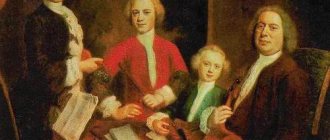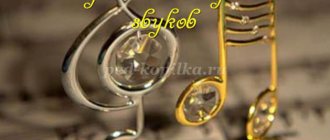Lesson “Ancient song world”
— So, you and I learned from the presentation that, being naturally kind and cheerful, Schubert also wrote very bright, sincere music. Franz Schubert is a great Austrian composer who went down in music history as the founder of musical romanticism. Romanticism is an artistic movement in the art of European countries that arose at the turn of the 18th-19th centuries. The romantic worldview is characterized by a sharp conflict between reality and dreams. It was music in the era of romanticism that took a leading place in the art system. Franz Schubert is the creator of a number of new genres: the romantic symphony, the piano miniature, and the vocal ballad.
Songs occupy the main place in Schubert's work. It was Schubert who elevated this genre, previously considered insignificant, to the level of artistic perfection.
4. Listening to “Evening Serenade” by F. Schubert.
Carrying out an analysis of the work.
One of Schubert's most beautiful songs is “Evening Serenade”. I would like us to enter into Schubert’s work to the melody of this beautiful song. In search of plots for his songs, Schubert turned to the poems of many poets (there are about 100 of them). Schubert “discovered” the romantic poet Ludwig Relstab
and it was on his poems that I wrote a serenade. Serenade is a song performed for a beloved, usually at night under her window. Schubert's famous "Serenade" is one of the masterpieces. Listen to a short fragment of this song and describe the feelings this song makes you feel.
(Listening to “Serenade” and student responses)
5.Listening to the ballad “The Forest King” by F. Schubert. Carrying out an analysis of the work.
The composer was very sensitive to the theme and selection of verses for his songs, paying attention to the musicality of the verse.
— Which of the great Russian poets do you think has the most musical poems? That's right with Pushkin.
— Poem by the great German poet Johann Wolfgang Goethe
“The Forest King” inspired 18-year-old Schubert so much that in one evening he wrote a song, the ballad “The Forest King.”
The translation into Russian was written by the Russian poet Vasily Andreevich Zhukovsky
, one of the founders of romanticism in Russia, a contemporary of Alexander Sergeevich Pushkin.
Vocal ballad
is a song that has free development. The plot of the ballad is acutely dramatic; reality and fantasy are intertwined.
Now I invite you to listen to the ballad “The Forest King” in German.
When listening to music, pay attention to the combination of melody and accompaniment, expressiveness and imagery. Try, without understanding the text (if you haven’t learned German), to determine on an emotional level what is happening in this work (excitement or peace, joy or fear, etc.), how many characters (4), name the performer (male voice) and Pay special attention to the accompaniment (piano).
Summary of a music lesson in 6th grade: “The world of an ancient song”
Summary of a music lesson in 6th grade “The world of an ancient song”
The purpose of the lesson:
formation of knowledge about the “ballad” genre using the example of the work of F. Schubert.
Tasks:
| Educational | Developmental | Educational |
F. Schubert;
|
|
|
Forms of work:
frontal, group, individual.
Methods:
method of generalization through genre, method of intonation-style comprehension of music, method of identity and contrast, method of interdisciplinary interactions, plastic intonation, conversation.
Basic Concepts
: genre, intonation, musical image, barcarolle, ballad, contrast.
Musical and artistic material: "
Barcarolle" by F. Schubert, ballad "The Forest King" by F. Schubert, "Ballad of Guitar and Trumpet" music
Y. Frenkel, poems by Y. Levitansky; paintings: M. Vorobyov “Oak, crushed by lightning”, K. Bogaevsky “Classical landscape”,
K. Koro “Gust of Wind”, J.A. Koch "Mountain Landscape".
UMK, TSO:
Sergeeva G.P., Kritskaya E.D. Music. 6th grade: textbook for general education organizations. - M.: Prosveshchenie, 2019; Sergeeva G.P. Music. Reader of musical material. 6th grade - M.: Education, 2016; phonochrestomathy; laptop; screen; projector; electronic piano.
During the classes
1.Organizational stage.
Musical greeting of students, checking the level of readiness for the lesson. Emotional mood for an art lesson.
2. Updating knowledge.
Guys, tell us about your encounters with music during the holidays (students can express their impressions of concerts and music they listened to).
Let's remember what kind of music was heard more during the lessons in the 1st quarter - vocal or instrumental? We got acquainted with the images of vocal music of Russian composers (name works).
Musical image is the main concept of this school year.
Repetition of musical vocabulary: musical image, intonation, vocal genres, instrumental genres (students define musical concepts).
At the last lesson we began to get acquainted with the music of foreign composers. What new genre did you discover? Barcarolle.
Explain this word.
Where are songs on the water common? In Italy.
A fragment of “Barcarolle” by F. Schubert is played
Who wrote this barcarolle? F. Schubert is an Austrian composer.
What works of F. Schubert did we encounter in 5th grade? “Trout”, “Forellen - Quintet”.
3. Motivation for students' learning activities. Setting the topic and purpose of the lesson.
Today in the lesson we will continue our acquaintance with the work of Franz Schubert. And I want to start it with the words of the composer:
“I sang songs and sang them for many, many years. When I sang about love, it brought me suffering, When I sang about suffering, it turned into love. So love and suffering tore my soul apart.” F. Schubert
Guys, what can you tell about the composer from this statement?
Students can note that F. Schubert loved songs, was a very sincere, impressionable person, and experienced and felt music with all his soul.
What would you like to learn in class today? Let's try to set a goal. (students answer)
The purpose of the lesson
– get acquainted with the composer’s work, the world of musical images of one of F. Schubert’s songs.
4. Work on the topic of the lesson.
Franz Schubert lived and worked in the era of romanticism, when musicians often turned to the inner world of a person, to his feelings and experiences.
Student message “F. Schubert - a romantic from Vienna"
In the 18th-19th centuries. V. Musical evenings were popular, where music was played and people who were passionate about art came. The wonderful evenings of F. Schubert's time were called Schubertiades
, where the young composer gave his creativity to friends. Franz Schubert was a modest and very talented man. He played beautifully and loved to improvise and compose. It was on such evenings that many dances were written - landlers, waltzes, gallops, ecosaises. But the song occupied the main place in the composer’s work. He has written over 600 of them!
Guys, find in the text of the textbook on p. 40 what is typical for the songs of F. Schubert (one student is reading).
F. Schubert is considered the creator of a special song - a vocal ballad.
Let's study a brief history of the ballad. Analyzing the textbook material, fill out a table in your notebook that will reflect the main points in the development of the genre.
Ballad
| Ancient world | Middle Ages | XVIII-XIX centuries |
| dance song | narrative song | vocal or instrumental piece of a romantic nature |
| Characteristic features of the ballad: narrative, picturesque, dramatic expression of feelings, the connection between music and poetic text, contrasting images. | ||
There is a new concept in the musical dictionary: Ballad -
it is a vocal or instrumental piece of a romantic nature. (write in the dictionary)
In what other lessons did you encounter the ballad genre? (in literature lessons - students can remember the ballad “Cup” translated by V.A. Zhukovsky, which they read in 5th grade).
Today we will listen to the ballad F. Schubert, which he wrote at age 18 in one evening, inspired by a poem by the German poet J.W. Goethe.
The ballad “The Forest King” by F. Schubert performed by I.S. Kozlovsky.
Guys, what did the music tell you? What picture appeared before your eyes? ( students express their impressions of music
).
What title would you give this ballad? ( answers
).
The ballad is called "The Forest King". The translation was made by the Russian poet V.A., already familiar to you. Zhukovsky (read an excerpt of the ballad in the textbook).
Pay attention to the number of verses. How is a ballad different from a song? Lots of verses, larger vocal piece.
5.Initial check of understanding.
Intonation-figurative analysis of the work.
Who sang the ballad? Soloist.
Performed by I.S. Kozlovsky is a great singer. Accompanying instrument: piano.
What characters are there in the ballad?
What kind of music does the composer convey the state of the characters and the content of the work?
Let's listen to the intro, which already sets the listener up for a ballad (play the intro).
Describe the intonation of the introduction. Anxious. The melody sounded in a low register, in a minor key.
What was the rhythm like? Short durations, sharp rhythm.
The piano accompaniment plays a large visual role. Let's try to convey the nature of the accompaniment, tap the rhythm to the music (you can do this with a pencil on the desk or by clapping).
What feeling does it feel? The feeling of constant movement, the rhythm of racing.
Using an emotional dictionary, select words that characterize the music of the ballad (a fragment sounds - working with a dictionary of emotions). Anxiously, quickly, excitedly, etc.
Can we say that F. Schubert's ballad is a dramatic scene? Yes.
There are several characters here. To the music, we find ourselves in a special world - a fantastic world - the world of the forest king and the real world - where we see a father and son dying in his arms. A fantastic plot is also a characteristic feature of the works of romanticism.
Do you guys agree that music portrays each character differently? Each of the characters in the ballad has its own musical characteristic.
Listen to the intonations of the child’s father and the forest king. Look at the musical notation in the textbook on p. 44 (play and sing - see textbook p.44)
What is unique about each intonation? Group 1 characterizes the father’s intonation, group 2 – the child’s intonation, group 3 – the king’s intonation.
(students work with a table of means of musical expression, note the features of melody, dynamics, timbre, register.)
Child -
fear, horror, prayer (by what means of expressiveness does the composer convey this).
Father -
calmness, consolation (by what means of expressiveness does the composer convey this).
Forest king -
affectionate intonation, but one can hear deceptiveness (by what means of expressiveness does the composer convey this).
So, we heard a sharp change in intonation and episodes with a repeating melody. What techniques for developing music did the composer use? Development techniques - repetition and contrast
(sharp contrast).
What contrasting figurative spheres can be identified in the ballad music? Life and death, light and darkness.
How does the ballad end? (listen to the latest episode) There is a stop. The last phrase sounds: “The dead baby lay in his hands.”
Guys, what is the musical image in this work? Dramatic.
Did the performer manage to convey the picture of the forest and dramatic events? What is very important in performing music? (expressiveness, intonation, skill of the performer)
Music is a very expressive and visual art. The means of musical expression that the composer used conveyed the content very truthfully.
Guys, look at the pictures in the textbook on pp. 46-47. Compare them with F. Schubert's ballad.
What paintings are similar in mood to F. Schubert's ballad? What do they have in common? ( students' answers
).
6. Vocal and choral work
.
Is it possible to find ballads in modern music? ( students can remember rock ballads
)
If you trace the evolution of this genre, you can hear the ballad at different times (instrumental ballads by F. Chopin, jazz ballads, modern songs written in the spirit of the ballad).
Today I propose to learn “Ballad of Guitar and Trumpet”
music by Y. Frenkel, poetry by Y. Levitansky)
(hearing performed by E. Kamburova).
The ballad was written in 1970. What eternal theme lives in this music? Theme of heroism and patriotism
.
It was she who became the main one in the work of many musicians, poets, writers, and artists. Millions of people gave their lives in the fight against fascism, in the fight against evil. Why can this song be classified as a ballad? Narration, then anxiety, drama of the climax.
Guys, how should this ballad be performed? (students draw up an initial performance plan - emotionally, consciously, thinking about every word.)
Before we start learning the ballad, let’s do breathing exercises and sing.
Exercise "Candle"
Chanting - vocalization.
Phrase-by-phrase learning of 1-2 verses (work on intonation, rhythmic difficulties - show the rhythm with a gesture). Execution by subgroups.
7. Summing up. Reflection.
Which composer did we continue to get acquainted with today in class? What era did he live in? What new vocal genre did F. Schubert create? What is characteristic of him?
What types of art did we “meet” in our lesson today? Literature, music and painting.
What music played during the lesson did you particularly remember and like? Did it seem unclear? Are there any guys for whom the ballad “The Forest King” turned out to be difficult to understand and perceive? What surprised you in the lesson?
P.I. Tchaikovsky said the following words about F. Schubert: “What an inexhaustible wealth of melodic invention was in this composer who ended his career untimely! What luxury of fantasy and sharply defined originality.”
Guys, I think that F. Schubert’s ballad helped us today to be transported into the wonderful world of musical images, to see the “world of the old song” and to understand the main features of the composer’s creative style.
Evaluate your work in class and fill out the self-assessment sheet.
Filling out the self-assessment sheet.
8. Homework.
Textbook – pp. 40-47, listen to the ballad “The Forest King”, draw a picture - convey the content and character of the music with paints; learn “The Ballad of Guitar and Trumpet.”
Bibliography
- Galatskaya V.S. Musical literature of foreign countries. Issue III.-
M.: Muzyka, 2008.
- Sergeeva G.P., Kritskaya E.D. Music. 6th grade: textbook for general education organizations. - M.: Prosveshchenie, 2019.
- Sergeeva G.P. Music. Reader of musical material. 6th grade.-
M.: Education, 2016.



